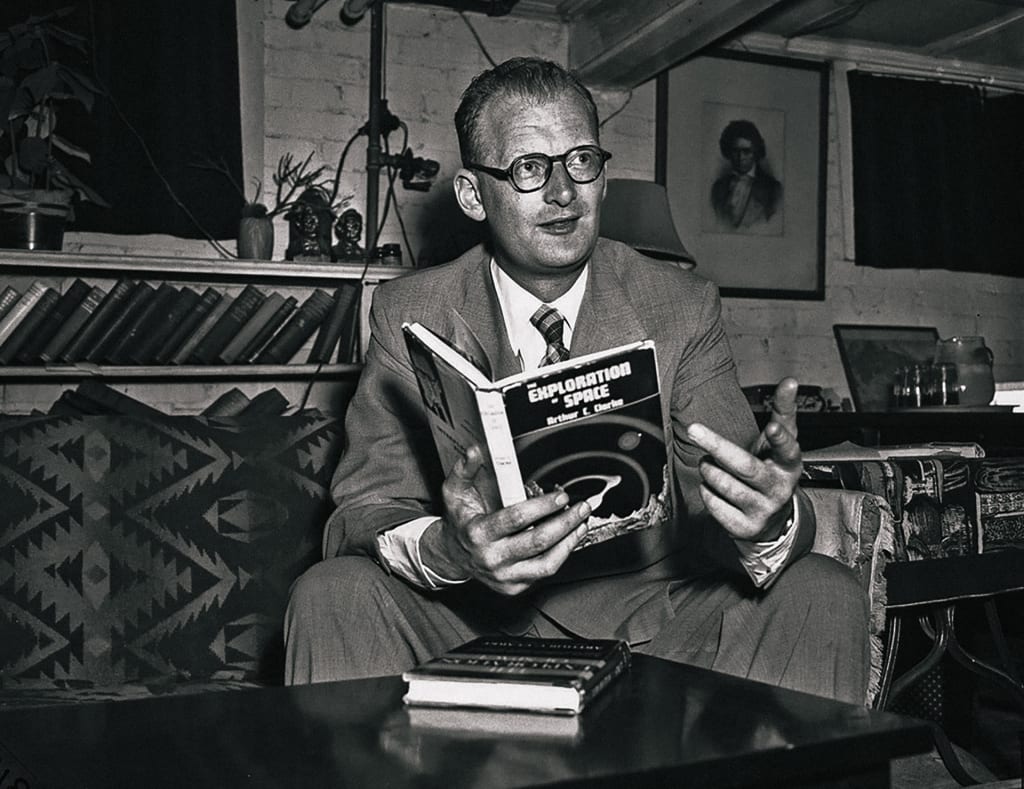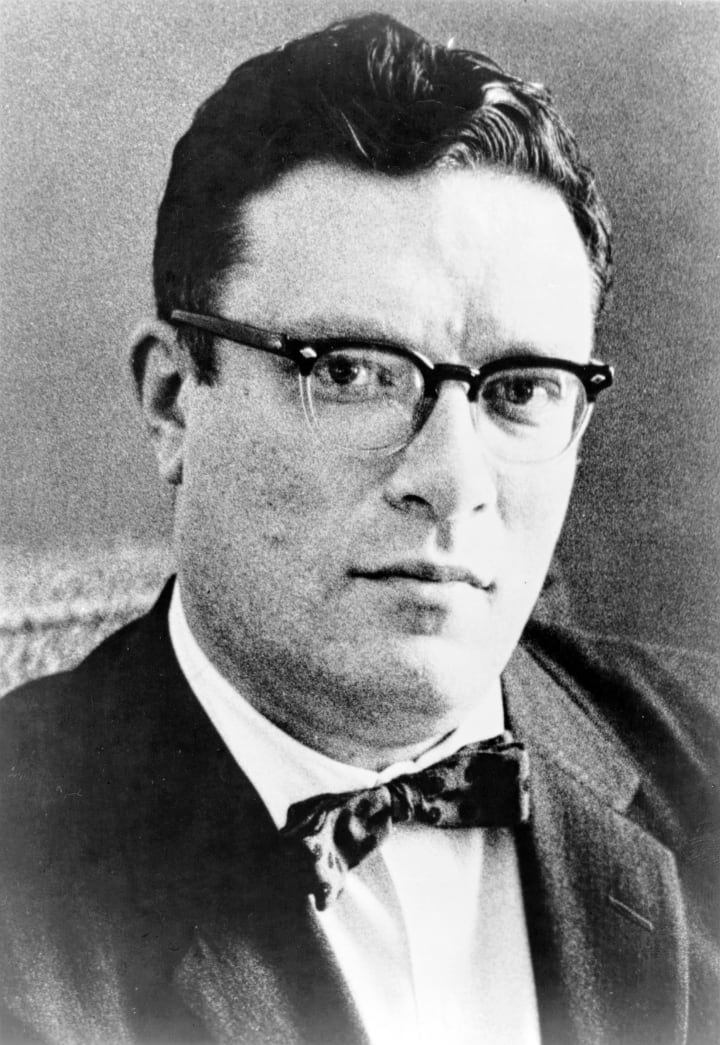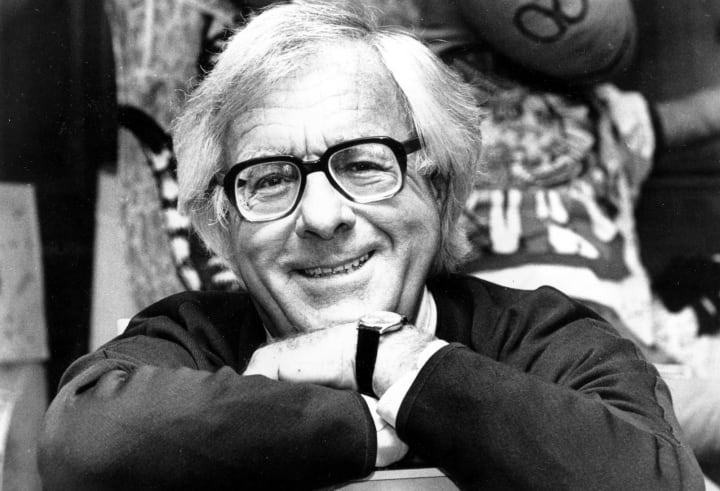Most Famous Authors Who Published in Omni Magazine
Pioneers in science and science fiction, these famous authors offered Omni some of the original greats of the genre.

From 1978 to 1998, OMNI Magazine released countless articles about then-cutting edge science and society, making it one of the most prominent science-related products on the market. Bob Guccione's project came to life thanks to a multitude of regular contributors, writers, and editors.
But, when combing through OMNI's extensive archive, one finds some interesting names turn up. There are many, many famous science fiction and fantasy writers who wrote for OMNI over the years. Many stood as titans in the industry. Others were nobodies who saw success in the years following their submissions.
These authors contributed to the legacy, and, in doing so, crafted a tapestry of creativity and brilliance that enriched the lives of millions of readers from 1978 to today.
Isaac Asimov

Asimov requires no introduction to those acquainted with science fiction. To those unacquainted, though, Asimov is the author of such classic sci-fi novels as Foundation and I, Robot. In a time where science fiction was seen as something of a joke or niche market, Asimov took the genre seriously.
Asimov died in 1992, but even until his death, he wrote. Asimov contributed countless articles of science fact, making him one of the most famous authors published in OMNI Magazine over the years. Interviews held with Asimov, as well as Asimov's personal predictions for the future, were published in OMNI until Asimov's passing.
Featured in:
- "Found!"in Omni Magazine October 1978
- "Foundation's Edge" in Omni Magazine October 1982
- "The Robots Of Dawn" in Omni Magazine October 1983
- "Poli-Sci-Fi" in Omni Magazine November 1984
Greg Bear

Greg Bear may not be a household name like Isaac Asimov, but his influence on science-fiction – and, indeed, nerd culture as a whole – is undeniable. One of the co-founders of San-Diego Comic-Con, publisher of over forty-four novels, Bear is a titan of the industry and a famous author published in OMNI Magazine.
And, yes, he published frequently in OMNI.
Featured in:
- "Petra" in Omni Magazine February 1982
- "Dead Run" in Omni Magazine April 1985
- "Tangents" in Omni Magazine July 1986
- "The Visitation" in Omni Magazine June 1987
George R.R. Martin

George R.R. Martin, author of A Game of Thrones and the subsequent A Song of Ice and Fire series, is a titan in genre fiction now, but in 1979, he was just another author, looking for his biggest break. (Granted, he had awards under his belt before this, most notably his novella "A Song for Lyra.")
During the magazine's first year, Martin submitted – and published in OMNI Magazine – his novelette "Sandkings." This short story appeared in OMNI's August 1979 issue. The story would go on to win both a Nebula and Hugo Award, the only story Martin published to win both. The story would eventually be adapted into the first episode of The Outer Limits relaunch in 1995.
But that was hardly Martin's only contribution to the magazine. "The Way of Cross and Dragon" (June 1979), which exists in continuity with "Sandkings." It won a Hugo in 1980. This loose continuity of stories would eventually be collected in both the Sandkings anthology, as well as a "fix-up" novel Tuf Voyaging. Additionally, there was "Under Seige" (1985).
However, Martin's contribution to the early life of OMNI established it as a prestigious publication for science fiction and fantasy.
Featured in:
- "The Way Of Cross And Dragon" in Omni Magazine June 1979
- "Sandkings" in Omni Magazine August 1979
- "The Pear-Shaped Man" in Omni Magazine October 1987
- "Schrödinger's Kitten" by Omni Magazine September 1988
Robert Silverberg

Robert Silverberg may not be the most famous writer in mainstream society, but he has been a presence in the genre for a very long time and a famous author published in OMNI Magazine. Winner of multiple Hugo, Nebula, and Locus awards, Silverberg is noted for attending every single Hugo Award ceremony since its inception. He stands as a Grand Master in the Science Fiction Writer's Association (SFWA), and has published and edited so many books on science fiction that he could literally fill a library. And then have books left over.
Robert Silverberg might have been one of the most frequent contributors to OMNI Magazine in its great history. How many works did he submit? Well...
- "Our Lady of the Sauropods" in Omni Magazine September 1980
- "The Palace of Midnight" in Omni Magazine July 1981
- "The Soul-Painter and the Shapeshifter" in Omni Magazine November 1981
- "The Far-Side of the Bell-Shaped Curve" in Omni Magazine March 1982
- "Amanda and the Alien" in Omni Magazine May 1983
- "Multiples" in Omni Magazine October 1983
- "Hail to the Chief" in Omni Magazine November 1984
- "Against Babylon" in Omni Magazine May 1986
- "Hardware" in Omni Magazine October 1987
- "Hannibal's Elephants" in Omni Magazine October 1988
- "To the Promised Land" in Omni Magazine May 1989
- "The Catch" in Omni Magazine March 1991
- "Hunters in the Forest" in Omni Magazine October 1991
He writes a lot.
Stephen King

The Master of Horror, Stephen King, has two primary contributions to OMNI Magazine, and both of them merit discussion. In a career as prolific as King's, of course, just about everything he's written bares note in the history books.
The first contribution King made was an excerpt from his novel Firestarter, which would later be adapted into a film staring a young Drew Barrymore.
Obviously, King did not write the excerpt for OMNI. But he did write the short story "The End of the Whole Mess" for OMNI, which appeared in 1986. The short story would later be collected in King's publication Nightmares and Dreamscapes, and, in 2006, was adapted for TNT's adaptation of Nightmares and Dreamscapes.
Featured in:
Orson Scott Card

The writer of Ender's Game and no stranger to controversy, Orson Scott Card published one of his greatest short stories in an early issue of OMNI Magazine... among plenty of other gems from this master of science fiction writing.
"Unaccompanied Sonata" (March 1979) was nominated for a Hugo and Nebula Award, and would go on to be the centerpiece of Card's anthology Unaccompanied Sonata and Other Stories. Card also published his short pieces "Deep Breathing Exercises" (July 1979), "Quietus" (August 1979), "Fat Farm" (January 1980), "A Sepulcher of Songs" (June 1981), and "The Changed Man and the King of Words" (December 1981) for OMNI.
These short publications helped elevate Orson Scott Card in the hierarchy of SFF writers, but it was Card's publication of Ender's Game, once again, that brought him up to mainstream glory.
Featured in:
- "Unaccompanied Sonata" in Omni Magazine March 1979
- "Deep Breathing Exercises" in Omni Magazine July 1979
- "Quietus" in Omni Magazine August 1979
- "Fat Farm" in Omni Magazine January 1980
- "A Sepulcher of Songs" in Omni Magazine June 1981
- "The Changed Man and the King of Words" in Omni Magazine December 1981
William Gibson

Some of the writers who contributed to OMNI were established figures in science fiction long before contributing. William Gibson was one of the first writers to launch their own career off of the magazine after he became one of the famous authors published in OMNI Magazine. This is the guy who invented the cyberpunk and steampunk genres. Hell, the word "cyberspace" first appeared in OMNI Magazine.
To date, all but four of Gibson's eleven short stories have been published in OMNI, including the classic "Johnny Mnemonic," which is often regarded as one of the first cyberpunk stories ever written. Published in May 1981, it would later be adapted to a (disappointing) film starring Keanu Reeves.
Other gems of Gibson's include "Hinterlands" (October 1981), "Burning Chrome" (July 1982, and first appearance of word "cyberspace"), "Red Star, Winter Orbit" (written with Bruce Sterling, July 1983), "New Rose Hotel" (Unofficially published in 1981, but appeared in OMNI in 1984), "Dogfight" (with Michael Swanwick, July 1985), and "Skinner's Room" (November 1991). With the exception of "Skinner's Room," all these stories were collected in Gibson's anthology Burning Chrome.
Featured in:
- "Johnny Mnemonic" in Omni Magazine May 1981
- "Hinterlands" in Omni Magazine October 1981
- "Burning Chrome" in Omni Magazine July 1982
- "Red Star, Winter Orbit" in Omni Magazine July 1983
- "New Rose Hotel" in Omni Magazine July 1984
- "Dog Fight" in Omni Magazine July 1985
- "Skinner's Room" in Omni Magazine November 1991
Bruce Sterling

Often a collaborator with William Gibson, Bruce Sterling launched his career in the pages of OMNI. In these pages, Sterling helped codify and create the medium of cyberpunk.
Later on, with Gibson, Sterling would release The Difference Engine, which invented the steampunk movement. It is undeniable to understate how important a role Sterling played in the development of science fiction.
Sterling, one of the most famous authors published in OMNI Magazine, contributed numerous publications, including the aforementioned "Red Star, Winter Orbit," but also include "Sunken Gardens" (July 1984), "Mozart in Mirrorshades" (written with Lewis Shiner in September 1985), "The Gulf Wars" (February 1988), and "Sacred Cow" (January 1993).
Featured in:
- "Red Star, Winter Orbit" in Omni Magazine July 1983
- "Sunken Gardens" in Omni Magazine July 1984
- "Mozart in Mirrorshades" in Omni Magazine September 1985
- "The Gulf Wars" in Omni Magazine February 1988
- "Sacred Cow" in Omni Magazine January 1993
Ray Bradbury

Ray Bradbury is one of the few writers to transcend the ghetto of genre fiction, and be regarded as something of a literary master. But unlike some creative minds who start off writing science fiction or horror only to distance themselves from it upon reaching mainstream success, Bradbury never forgot his roots, making him one of the most famous authors published in OMNI Magazine.
Over the course of OMNI's run, Bradbury contributed four short fiction pieces (published for the first time in OMNI), as well as two non-fiction articles. "Colonel Stonesteel's Genuine Home-Made Truly Egyptian Mummy" (May 1981), "I Suppose You are Wondering Why You Are Here," (October 1984), "Trapdoor" (April 1985), and "Once More, Legato" (Fall 1995).
HIs two nonfiction pieces dealt with philosophical musings. "Beyond Eden" (April 1980) discussed the future of the space program, while "The God in Science Fiction" (October 1980) focused on man's developing understanding of the divine. From beginning to end, Bradbury stood by OMNI. He remains an essential presence in OMNI's history.
Featured in:
- "Colonel Stonesteels Genuine Home-Made Truly Egyptian Mummy" in Omni Magazine May 1981
- "I Suppose You Are Wondering Why We Are Here" in Omni Magazine" in Omni Magazine October 1984
- "Trapdoor" in Omni Magazine April 1985
- "Once More, Legato" in Omni Magazine Fall 1995
Clive Barker

Clive Barker's name may not be familiar to you. However, his contributions to horror and dark fantasy are impossible to sum up in any number of words. Barker's influence on the genre of horror is akin to Lovecraft's – Barker influenced now generations of writers who followed in his footsteps.
It should be noted that Clive Barker did not submit fiction directly to OMNI with the intent of first publishing it in the magazine. However, in the October 1986 issue, OMNI reprinted his classic short story "Books of Blood" for the first time in the United States. The accompanying interview with him helped bring Barker to an American audience... though, ultimately, Hellraiser would cement Barker's role as one of the greatest writers of dark fantasy and horror.
Featured in:
Another one of science fiction's biggest titans, Arthur C. Clarke is the man behind Childhood's End, Rendezvous with Rama, and, of course, 2001: A Space Odyssey.
Clarke was very involved with OMNI, especially in the beginning of the magazine's run. He featured in television commercials advertising the magazine. While he would give interviews and the like over the magazine's lifespan, his most noteworthy contribution was a fascinating interview he gave, offered in its entirety here.
Featured in:
About the Creator
Frank White
New Yorker in his forties. His counsel is sought by many, offered to few. Traveled the world in search of answers, but found more questions.






Comments
There are no comments for this story
Be the first to respond and start the conversation.